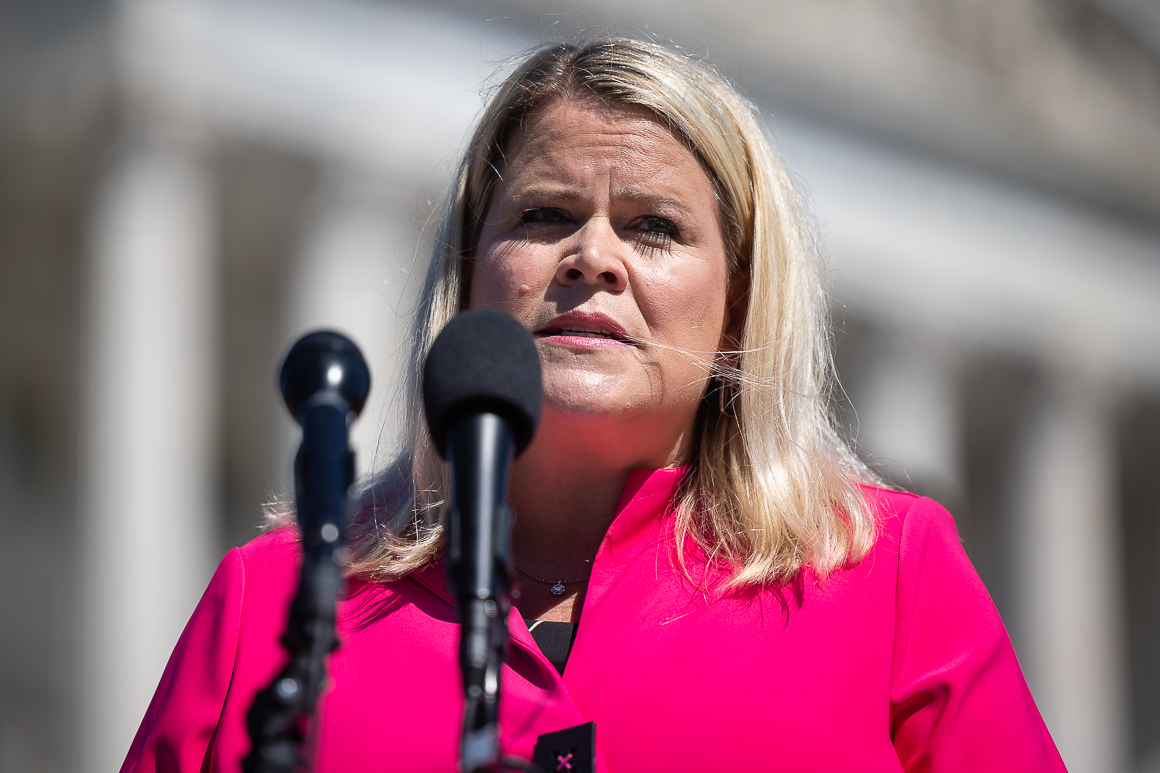Conservative climate change advocates may not see eye-to-eye with their liberal counterparts on a host of issues, but they do share something important: their funding sources.
Philanthropic donors like Bill Gates’ Breakthrough Energy Foundation, the Charles Stewart Mott Foundation and the MacArthur Foundation that fund Democratic-aligned green groups like the League of Conservation Voters are also spending millions on “eco-right” groups — as they are commonly known — according to an analysis by POLITICO’s E&E News.
The conservative groups, such as Citizens for Responsible Energy Solutions and the American Conservation Coalition, eschew policies like regulation and big spending to fight climate change. They dismiss such actions as partisan ideas that won’t spur innovation to transform the planet. And donors are fine with that.
At the same time, they reject the denial of climate science that persists among many Republican elected officials, including former President Donald Trump.
Donors say funding both political sides is a strategy to make climate legislation more durable. They argue the problem of climate change is so vast that business, entrepreneurs and politicians of all stripes need to be involved in the fight. Indeed, one of the eco-right’s goals is to engage congressional Republicans on the issue.
One philanthropic group, the Mott Foundation, goes even further. The foundation, which was founded by the late co-owner of General Motors and funds causes in areas like education and health, said its goal is to “build the capacity of the center-right groups.”
The findings, revealed in tax disclosure documents from 2018 to 2022 and analyzed by E&E News, showed the following:
- The Conservative Coalition for Climate Solutions, or C3 Solutions, has in recent years received, along with its affiliate, at least $850,000 from philanthropic donors that have also spent tens of millions on left-leaning green groups. In 2022 alone, the group, which advocates for conservative values like fiscal responsibility and economic growth, got more than 40 percent of its annual revenue from Gates’ Breakthrough group.
- Citizens for Responsible Energy Solutions, or CRES, got more than $24 million along with its affiliate from such donors in recent years. The bulk of its haul came from Clean Future Forum, a relatively unknown clean energy organization.
- The Conservative Energy Network, which focuses on state clean energy policies, received more than $11 million from several major funders, including the MacArthur Foundation and Clean Future Forum.
- The Alliance for Market Solutions, which advocates for pricing carbon dioxide emissions, raked in more than $8 million from the Linden Trust for Conservation, founded by Larry Linden, a big Democratic donor.
“The conversation about the crisis has really broadened,” said Mijo Vodopic, head of the climate program at MacArthur, which was founded by insurance magnate John MacArthur and his wife, Catherine, and funds organizations in areas like journalism and criminal justice. The foundation has also given grants in recent years to Citizens for Responsible Energy Solutions Forum, an arm of CRES.
“We have been adamant about trying to be nonpartisan but recognizing we do need to be thinking about other political constituencies, other communities and really as broad as we can when we think about equity,” Vodopic said.
No ‘litmus test’
While partisans may look askance at the development, the funding streams may be the new normal in the world of climate philanthropy. Funders are increasingly committed to finding ways to get policymakers from both parties interested in ambitious solutions.
Interviews with executives at several foundations revealed similar lines of thinking: They tended to shy away from discussing the politics of the issue much. And they veered toward general comments rather than specific points.
“We don’t actually come at it from a political or ideological perspective,” Michael Boots, executive vice president at Breakthrough, said in a recent interview.
“We come at it from a pretty analytical, technology-driven, pragmatic side of that, where we’re open to working with anybody that’s also committed to tackling that challenge.”
Breakthrough — which is primarily funded by Gates, the founder of Microsoft — aims for net-zero greenhouse gas emissions worldwide by 2050. It stands out from other major philanthropic donors supporting the conservative climate groups because its sole focus is climate change.
Gates has, over the last decade, put a significant part of his philanthropic money into innovation, which he argues is the most important factor to decarbonizing electricity, agriculture, transportation and other major greenhouse gas-emitting sources around the world.
Boots, who led the White House Council on Environmental Quality under President Barack Obama, wasn’t bothered by rhetoric from many Republicans on Capitol Hill downplaying humans’ contribution to climate change. He professed apolitical motivations while acknowledging the unavoidable political nature of Washington.
“We support anyone who is serious about tackling this challenge,” he said. “So that shows up in a variety of ways: whether they’re deep on some of the sectors we’re working on, whether they’re serious about the technologies and the innovation cycle that’s in front of us, whether they are long-term thinkers about the economics of getting the costs down.”
The Breakthrough Energy Foundation and Breakthrough Energy Action started giving grants in 2021. Recipients have included C3 Solutions; CRES; and the Joseph Rainey Center, a conservative think tank led by Sarah Hunt, who has worked on climate issues with the American Legislative Exchange Council and the market-oriented Niskanen Center.
Other philanthropic officials said they were not concerned that their grantees sometimes had divergent positions on a particular policy — such as the Biden administration decision to pause natural gas export approvals.
“We don’t follow any kind of litmus test,” Vodopic of MacArthur said.
Following the money
The Mott Foundation said it has given in the last three years to groups such as the Climate Leadership Council, C3 Solutions and the American Conservation Coalition. CLC got the bulk of the money at $1.4 million.
“It’s going to require a bipartisan solution particularly for it to be durable,” said Samuel Passmore, director of Mott’s environment program.
“When you look at the climate space, the right-leaning groups are quite a bit under-resourced compared to the left-leaning groups. It’s important to build the capacity of the center-right groups who genuinely want to solve the problem.”
The foundation grants can represent a big chunk of eco-right groups’ budgets, tax filings show. The conservative C3 Solutions got more than 40 percent of its revenue from Gates’ Breakthrough Energy Foundation in 2022.
The U.S. Energy Foundation, a clean-energy-focused philanthropic organization, provided more than a third of the Conservative Energy Network’s 2022 revenue.
For groups that give to both sides, however, liberal operations are usually getting significantly more than their conservative counterparts.
MacArthur, for example, gave $3 million to the Sierra Club and $2 million to LCV in 2022, but $500,000 to CRES Forum, the separate educational arm of the organization.
The U.S. Energy Foundation — which has energy and environment leaders from both parties on its board — gave $75,000 that year to the American Conservation Coalition and $375,000 to the R Street Institute, but $570,000 to more liberal organizations like Environment America and $885,000 to Ceres.
Karly Matthews, spokesperson for the American Conservation Coalition, a youth-focused organization that pushes for limited government and innovation in climate policies, said that the group will “work with anyone who shares our mission of building the conservative environmental movement.”
The U.S. Energy Foundation declined to comment. Board members include former Florida GOP Rep. Carlos Curbelo and Obama EPA official Arvin Ganesan.
There are some organizations with a very light footprint that are giving to both conservative and liberal groups.
The Clean Future Forum, which says in tax filings it has offices in Washington but has no discernible website, has in recent years given to the Environmental Defense Fund and National Audubon Society but also to the conservative CRES Forum.
CRES Forum got more than half of its 2021 and 2022 revenue from the Clean Future Forum. CRES, like many advocacy organizations, has a 501(c)(4) affiliate for advocacy and a 501(c)(3) for educational purposes; CRES Forum is the 501(c)(3).
Clean Future Forum officials did not respond to requests for comment.
‘The money is green’
Devin Hartman, policy director for R Street’s energy and environment program, said the group initially focused on carbon pricing after it was launched in 2012, but has since expanded to regulatory reform and fiscal conservatism to fight climate and other environmental problems. R Street advocates for centrist conservatism in subjects like technology and health.
“This has been most successful when climate philanthropy understands the value of these groups and respects their independence to stay true to their principles,” he said. “Without getting into our particular fundraising strategies, a tagline I use is that climate solutions require more freedom, sunshine and innovation.”
Heather Reams, president of CRES, said foundation donors don’t expect groups like hers to challenge their conservative principles at all.
“There are obviously some organizations out there that believe in bipartisanship and that Republicans seem to be at the table,” she said.
“We’re delivering on that. We’re making sure Republicans are coming in and they’re not voting like Democrats, they’re voting in an authentically conservative way.”

Reams said she has no problem taking money from funders like Breakthrough, MacArthur and Clean Future. “The money is green,” she said.
“There’s a very limited amount of money for right-of-center organizations in the climate and energy space,” Reams said. “But I think we’re packing a pretty decent punch for the budget that we have.”
Alex Flint, executive director of the Alliance for Market Solutions, a carbon pricing advocate, agreed that funding sources from the right are limited.
But the situation has improved since he launched his group. “What we found in 2017 was that there was, and still is, a really challenging chicken-and-egg problem,” he said.
“We needed to raise funds for our work, but there were not sufficient right-of-center donors. And the Republican conversation about climate was so challenging that you couldn’t find the donors to build the right conversation, to demonstrate to the donors that you were being successful,” Flint said.
“And so the group of donors that finally stepped forward were ones who, even uncertain that there would be near-term progress, believe that eventually, durable climate policy requires bipartisan support.”
Flint’s group has gotten millions of dollars in recent years from the Linden Trust for Conservation, a foundation funded by Larry Linden, a former Goldman Sachs partner. The foundation also gives grants to the League of Conservation Voters, the National Wildlife Federation, Resources for the Future and others.
John Szoka, CEO of the Conservative Energy Network, said his group gets funding from people and organizations across the political spectrum, but he’s firm in his conservative principles.
“I think that the leaders of many of these philanthropies have come to the realization that they’re not going to get everything that they may want, if they’re to one extreme or the other, by mandates and things like that,” Szoka said.
“They understand that for the benefit of the country, we’ve got to work together. So we haven’t compromised our conservative viewpoint. We might just approach it from a different place.”
John Hart, C3 Solutions’ co-founder and vice president, said his group is “happy to receive support from anyone who is interested in advancing climate and energy policies rooted in economic freedom.”















